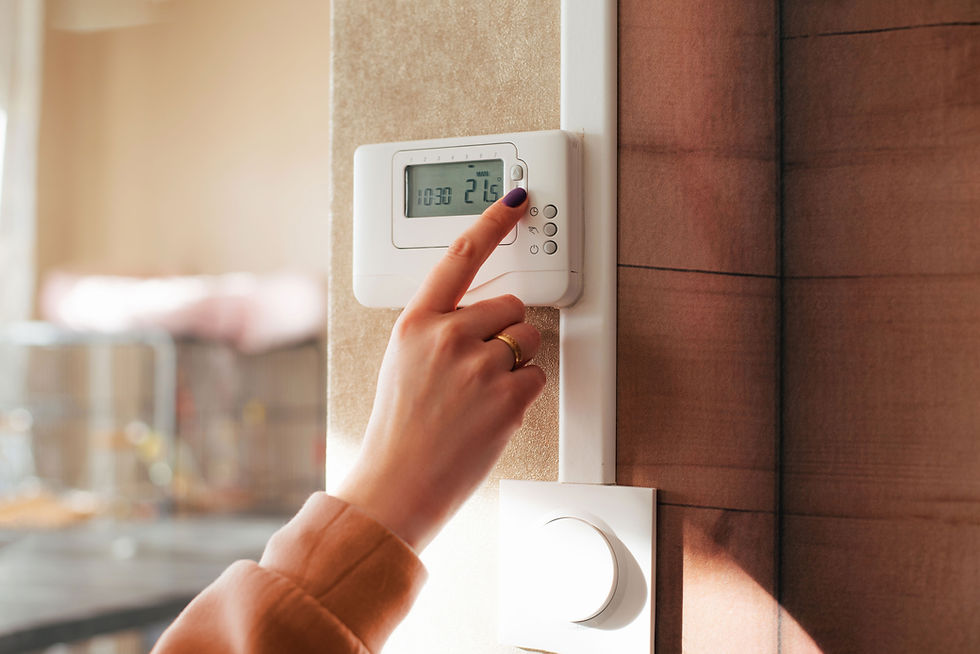Understanding HVAC Energy Ratings: What You Need to Know
- Jordan McNeil

- Nov 20, 2023
- 4 min read
Navigating the world of HVAC systems can be overwhelming, especially when it comes to understanding energy ratings. These ratings, such as SEER, AFUE, and HSPF, are all used in determining the energy efficiency of your heating and cooling systems. In this Elevate HVAC blog post, we'll break down what these ratings mean and how they impact your energy usage and bills.

As homeowners or property managers, being well-informed about these ratings can lead to better decisions regarding HVAC purchases and maintenance, ensuring that you not only save money but also contribute to a greener planet.
What are HVAC Energy Ratings?
HVAC energy ratings are standards used to measure the efficiency of heating, ventilation, and air conditioning systems. The higher the rating, the more efficient the unit is, which means lower energy bills and a reduced environmental impact.
SEER (Seasonal Energy Efficiency Ratio)
Definition: SEER measures the cooling efficiency of air conditioners and heat pumps. It calculates the ratio of the cooling output over a typical cooling season divided by the energy consumed in Watt-Hours.
Impact on Energy Usage: A higher SEER rating indicates greater efficiency. Modern air conditioners typically range from 13 to 21 SEER. Upgrading from an older, lower SEER unit to a higher SEER model can significantly reduce your cooling costs by saving energy.
AFUE (Annual Fuel Utilization Efficiency)
Definition: AFUE is a measure of a furnace's heating efficiency. It represents the percentage of fuel converted to heat in comparison to the amount of fuel used.
Impact on Energy Usage: Furnaces with higher AFUE ratings are more efficient. For example, a furnace with an AFUE of 90% means that 90% of the fuel is used for heating, while the remaining 10% is lost in the combustion process.
HSPF (Heating Seasonal Performance Factor)
Definition: HSPF is used to gauge the heating efficiency of heat pumps. It is the ratio of the total heating required during the heating season divided by the total electricity consumed.
Impact on Energy Usage: A higher HSPF rating indicates a more efficient heat pump. Upgrading to a unit with a higher HSPF can lead to reduced electricity usage for heating.
Why are These Ratings Important?
Okay, Okay. So now you know what these acronyms stand for, but why are they important? Well, your HVAC system has a lifespan of about 10-15 years. That means it will be consuming energy and costing you money month over month for 10-15 years. Understanding these ratings is key to choosing the most energy-efficient HVAC system for your home. Not only can it lead to significant cost savings, but it also promotes environmental sustainability.
Choosing the Right HVAC System for Your Home
When it comes to selecting an HVAC system, one size does not fit all. The climate you live in, along with your home's unique characteristics, play pivotal roles in determining the most suitable system. In Ontario, where the climate varies from hot and humid summers to cold and snowy winters, this consideration becomes even more crucial.
Consider Ontario's Climate
Summer Considerations: Ontario experiences warm and often humid, summers. During these months, an efficient air conditioning system is essential. Look for units with a high SEER (Seasonal Energy Efficiency Ratio) rating, as they are more efficient in cooling and consume less energy. A higher SEER rating means the system is better equipped to keep your home cool without skyrocketing energy bills, a must for those humid Ontario summer days.
Winter Considerations: Winters in Ontario can be harsh, with temperatures often dropping well below freezing. This is where a high AFUE (Annual Fuel Utilization Efficiency) rating becomes significant. Furnaces with higher AFUE ratings are more efficient at converting fuel to heat, ensuring that your home stays warm and cozy during the cold months. In Ontario's winter climate, an efficient heating system isn't just a matter of comfort, but of necessity.
Energy Efficiency and Cost Savings:
Balancing Efficiency and Cost: While high-efficiency units might have a higher initial cost, they can lead to significant savings in energy bills in the long run. This is particularly true in a region like Ontario, where extreme weather can lead to high energy usage during peak heating and cooling seasons.
Incentives and Rebates: In Ontario, there are often incentives and rebates available for installing energy-efficient HVAC systems. These can help offset the initial investment and encourage homeowners to opt for more efficient options. For example, in Ontario, we have the Canada Greener Homes Grant to help with the purchase of more energy-efficient systems.
HVAC Energy Ratings Conclusion
Choosing the right HVAC system for your home involves balancing energy efficiency ratings, the local climate, and your home's specific characteristics. Understanding SEER, AFUE, and HSPF ratings is more than just dealing with technical jargon; it's about making an informed choice that aligns with your lifestyle, the extensive demands of Ontario's climate, and your commitment to sustainable living. By selecting an HVAC system that aligns with these factors, you can ensure optimal comfort, lower energy bills, and a reduced environmental footprint. Additionally, consider consulting with HVAC professionals who have local expertise and can provide tailored recommendations for your home. For more insights, tips, and advice, don't hesitate to give us a call at Elevate HVAC. We're not just experts in heating and cooling; we're your partners in creating a comfortable, efficient, and sustainable home environment. Contact us today and we will be happy to answer any questions you may have (905) 664-4848.




Comments